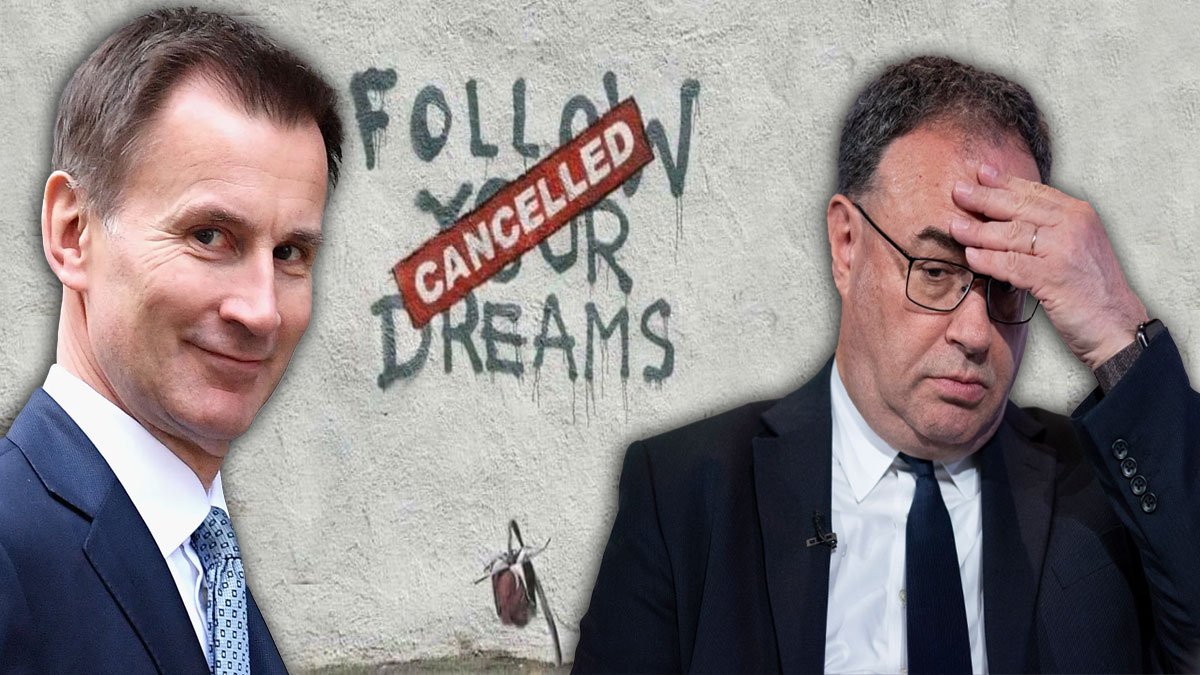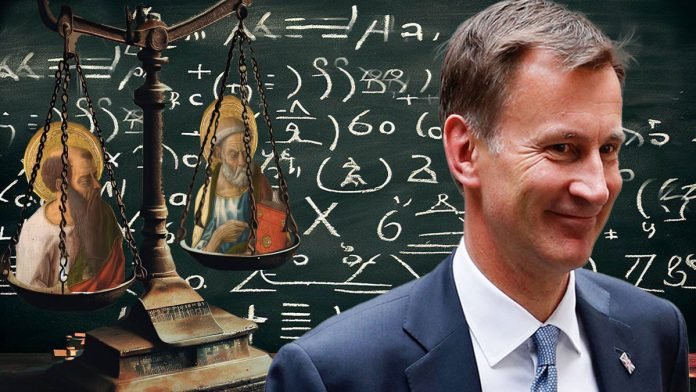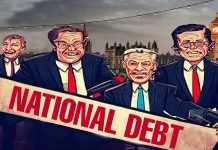Robbing Peter to Pay Paul: The Grim Reality of Public Pay Rises Adds Up to More Cuts and Austerity
It didn’t have to be this way…
The recent announcement of pay rises for millions of public sector workers seems like a classic case of robbing Peter to pay Paul. While it may appear as a positive development, it is important to dig deeper into the details.
Rishi Sunak has accepted all the recommendations of independent pay review bodies, which include increases for police officers, junior doctors, and teachers. However, the government has instructed government departments to fund these pay rises from existing budgets, forcing them to “reprioritise” their spending.
Under the plan, police officers, junior doctors, and teachers in England will be among those who receive a pay increase, as all the recommendations from independent pay review bodies have been accepted.
Asked where the money would come from to fund other pay awards, Mr Sunak said he would be asking government departments to re-prioritise their focus on pay, to you and me that’s cuts…
To finance these raises, the art of robbing Peter to pay Paul was employed. Police officers will see a 7% increase, partly funded by the Home Office increasing the cost of work and study visas. The Ministry of Defence will reduce the hiring of civil servants until 2025 to cover a 5% pay boost for armed forces personnel. Junior doctors’ pay will be supplemented by raising the immigration health surcharge, a fee paid by foreigners to access the NHS. Additionally, the education department’s budget will be adjusted to grant teachers a 6.5% raise.
While senior government figures have expressed concerns about potential inflationary effects, Treasury Minister John Glen emphasised that these pay awards are “responsible” and will not fuel inflation. The government asserts that these increases reflect their respect for the pay review bodies and their admiration for the contributions of public servants.
When questioned about funding for future pay awards, Prime Minister Sunak stated that government departments would need to reprioritise their spending focus, identifying areas where funds could be shifted without impacting frontline services. He also highlighted plans to increase charges for migrants applying for visas and accessing the NHS, which is expected to raise over £1 billion.
He told reporters that ministers had been identifying areas where “we may be not spending as much as we had anticipated, that we can shift over to public sector pay without impacting frontline service delivery”.
“That does mean choices – I’m not shying away from that,” he added.
However, concerns have been raised about the potential impact on public services and whether capital investment in schools and hospitals may be compromised to fund these pay increases. The FDA union, representing senior civil servants, welcomed the acceptance of the pay review body’s recommendations, considering them fair and reasonable.
With overall UK pay growing by 7.3% and inflation standing at 8.7% in May, the government has been cautious about further borrowing and the potential inflationary consequences. The budget had initially accounted for pay awards of 3.5%, meaning government departments will need to bridge a financial gap of £3 billion to £5 billion.

What pay rises have been offered?
- Police officers: 7% (England & Wales)
- Consultants, dentists and GPs: 6% (England)
- Junior doctors: 6% + £1,250 consolidated increase (England)
- Prison officers: 7% and more for support grades (England & Wales)
- Armed forces: 5% + £1,000 consolidated increase (UK)
- Teachers: 6.5% (England)

Earlier this week, Jeremy Hunt said delivering “sound money” was the government’s number one focus. In a Mansion House speech, the chancellor said: “That means taking responsible decisions on public finances, including public sector pay, because more borrowing is itself inflationary.
“It means recognising that bringing down inflation puts more money into people’s pockets than any tax cut. And it means recognising that there can be no sustainable growth without eliminating the inflation that deters investment and erodes consumer confidence.”
Sunak was similarly strict about not adding more to the national debt when he was asked about the decision on public sector pay earlier this week.
Speaking at the Nato summit in Lithuania on Wednesday, the prime minister said: “Everyone knows the economic context we are in and we need to make sure that government decisions, particularly when it comes to not borrowing more, are made responsibly so we don’t fuel inflation, make it worse or last for longer.”
The government has been resistant to offering above-inflation pay rises warning it would further fuel inflation.
On Thursday, junior doctors in England began a five day walkout, after their calls for a 35% pay increase were rejected.
The pay rise announcement has however brought some welcome news for No 10, the leaders of the National Education Union, Association of School and College Leaders, National Association of Head Teachers and NASUWT said they hoped to “resume normal relations with government”.
While the public sector pay increases are a step forward, the funding methods and potential trade-offs raise questions about the long-term sustainability and impact on other areas of public services.
Of course, as a sovereign nation, we possess the authority to issue our own currency, adjust our monetary policies, and raise our own debt ceiling. This is just another political choice made using an arcade monetary policy that no longer works in the 21st century.
We are Living in The Middle of a Robbery and The Government are Acting as an Accomplice,
The way the Tories are funding this pay rise is nothing more than robbery. a political choice. Or as Professor Richard Murphy says:

“It’s a straightforward lie to say that there is no money available in the government to pay these costs in that case. There clearly is. But the government is choosing to spend it on something else.
What is that something else? It is paying interest. And as I noted recently, this year the government will pay our commercial banks more than £40 billion more in interest than it did two years ago on the deposit accounts that they have to hold with the Bank of England.
The government does not need to pay all that. It could pay a great deal less, as happens in the Eurozone and Japan, for example. But it has instead decided that the banks must be paid in full, even though teachers, doctors, nurses and so many others apparently cannot be.
That is what is so hideous about this decision. What it hides is the fact that the government has chosen to favour banks over working people. The only reason why proper pay rises cannot be made is that banks are getting the money denied to our essential workers. There is nothing more or less to it than that.
Sunak, Hunt and all the other ministers who try to defend this deal will be lying when there is no money available to departments to pay for this deal and services must suffer instead. That’s only true because they are shovelling money into our banks instead.
They had a choice to deny interest on bank balances that commercial banks only have with the government because new money was created by it during the Covid and banking crisis eras, or to pay workers decent living wages. They chose bankers. And that is unforgivable.”
More so and unsurprisingly, the government shows no inclination to address the underlying cause of inflation: the energy companies. These entities operate with a business model built on exploitation and profiteering, capitalizing on their monopolistic control over essential resources.
Help Us Sustain Ad-Free Journalism
Sorry, I Need To Put Out the Begging Bowl
Independent Journalism Needs You
Our unwavering dedication is to provide you with unbiased news, diverse perspectives, and insightful opinions. We're on a mission to ensure that those in positions of power are held accountable for their actions, but we can't do it alone. Labour Heartlands is primarily funded by me, Paul Knaggs, and by the generous contributions of readers like you. Your donations keep us going and help us uphold the principles of independent journalism. Join us in our quest for truth, transparency, and accountability – donate today and be a part of our mission!
Like everyone else, we're facing challenges, and we need your help to stay online and continue providing crucial journalism. Every contribution, no matter how small, goes a long way in helping us thrive. By becoming one of our donors, you become a vital part of our mission to uncover the truth and uphold the values of democracy.
While we maintain our independence from political affiliations, we stand united against corruption, injustice, and the erosion of free speech, truth, and democracy. We believe in the power of accurate information in a democracy, and we consider facts non-negotiable.
Your support, no matter the amount, can make a significant impact. Together, we can make a difference and continue our journey toward a more informed and just society.
Thank you for supporting Labour Heartlands












